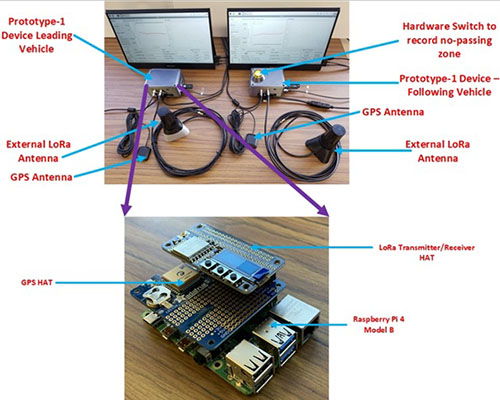

Research Reports |
| Title: | Developing a Prototype System for Establishing Passing and No-Passing Zones of Two-Lane Highways |
| Authors: | Ahmed Farid, Zephaniah Connell, James Mock, Suresh Muknahallipatna, and Khaled Ksaibati |
| University: | University of Wyoming |
| Publication Date: | Jul 2024 |
| Report #: | MPC-24-535 |
| Project #: | MPC-600 |
| TRID #: | 01929748 |
| Keywords: | detection and identification systems, highway design, intelligent transportation systems, no passing zones, passing sight distance, passing zones, prototypes, two lane highways |
| Type: | Research Report – MPC Publications |
 Two-lane highways comprise a considerable percentage of the nation's roads. A critical component required in the design of two-lane highways is the passing sight distance (PSD). In cases where it is inadequate, no-passing zones are established. There are multiple techniques employed for measuring the PSD in the field, and the Wyoming Department of Transportation (WYDOT) implements the two-vehicle method. However, WYDOT's apparatus used to implement the method is no longer functional. Hence, this project was aimed at proposing two state-of-the-art prototypes of the two-vehicle method and the first prototype, named Prototype 1, was replicated. The second prototype, Prototype 2, was designed to automate some of the functions of Prototype 1 by incorporating advanced intelligent transportation system devices. After the delivery of Prototype 1's units and that of the latter to WYDOT, the former's units were retrieved and upgraded such that their functionalities were similar to that of Prototype 2. As per the results of the testing of both prototypes, the equipment was not only efficient but also produced accurate results.
Two-lane highways comprise a considerable percentage of the nation's roads. A critical component required in the design of two-lane highways is the passing sight distance (PSD). In cases where it is inadequate, no-passing zones are established. There are multiple techniques employed for measuring the PSD in the field, and the Wyoming Department of Transportation (WYDOT) implements the two-vehicle method. However, WYDOT's apparatus used to implement the method is no longer functional. Hence, this project was aimed at proposing two state-of-the-art prototypes of the two-vehicle method and the first prototype, named Prototype 1, was replicated. The second prototype, Prototype 2, was designed to automate some of the functions of Prototype 1 by incorporating advanced intelligent transportation system devices. After the delivery of Prototype 1's units and that of the latter to WYDOT, the former's units were retrieved and upgraded such that their functionalities were similar to that of Prototype 2. As per the results of the testing of both prototypes, the equipment was not only efficient but also produced accurate results.
Farid, Ahmed, Zephaniah Connell, James Mock, Suresh Muknahallipatna, and Khaled Ksaibati. Developing a Prototype System for Establishing Passing and No-Passing Zones of Two-Lane Highways, MPC-24-535. North Dakota State University - Upper Great Plains Transportation Institute, Fargo: Mountain-Plains Consortium, 2024.